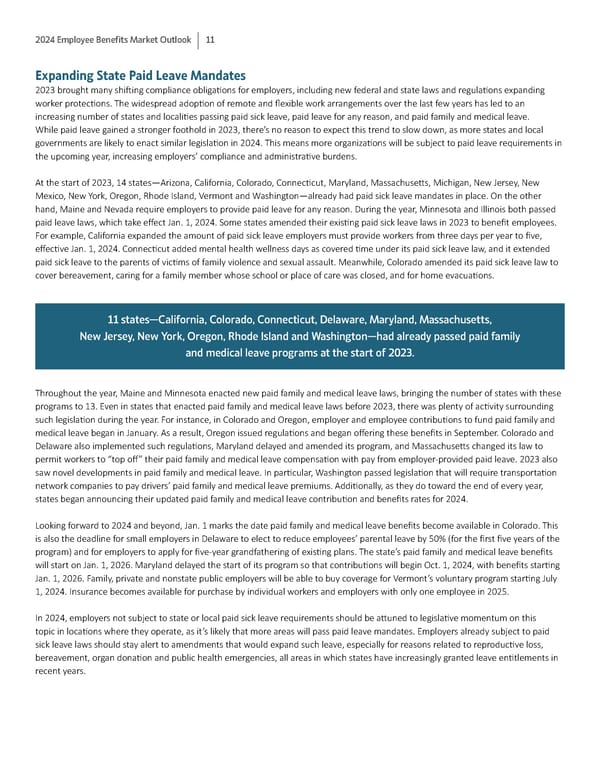2024 Employee Benefits Market Outlook 11 Expanding State Paid Leave Mandates 2023 brought many shi昀琀ing compliance obliga琀椀ons for employers, including new federal and state laws and regula琀椀ons expanding worker protec琀椀ons. The widespread adop琀椀on of remote and 昀氀exible work arrangements over the last few years has led to an increasing number of states and locali琀椀es passing paid sick leave, paid leave for any reason, and paid family and medical leave. While paid leave gained a stronger foothold in 2023, there’s no reason to expect this trend to slow down, as more states and local governments are likely to enact similar legisla琀椀on in 2024. This means more organiza琀椀ons will be subject to paid leave requirements in the upcoming year, increasing employers’ compliance and administra琀椀ve burdens. At the start of 2023, 14 states—Arizona, California, Colorado, Connec琀椀cut, Maryland, Massachuse琀琀s, Michigan, New Jersey, New Mexico, New York, Oregon, Rhode Island, Vermont and Washington—already had paid sick leave mandates in place. On the other hand, Maine and Nevada require employers to provide paid leave for any reason. During the year, Minnesota and Illinois both passed paid leave laws, which take e昀昀ect Jan. 1, 2024. Some states amended their exis琀椀ng paid sick leave laws in 2023 to bene昀椀t employees. For example, California expanded the amount of paid sick leave employers must provide workers from three days per year to 昀椀ve, e昀昀ec琀椀ve Jan. 1, 2024. Connec琀椀cut added mental health wellness days as covered 琀椀me under its paid sick leave law, and it extended paid sick leave to the parents of vic琀椀ms of family violence and sexual assault. Meanwhile, Colorado amended its paid sick leave law to cover bereavement, caring for a family member whose school or place of care was closed, and for home evacua琀椀ons. 11 states—California, Colorado, Connecticut, Delaware, Maryland, Massachusetts, New Jersey, New York, Oregon, Rhode Island and Washington—had already passed paid family and medical leave programs at the start of 2023. Throughout the year, Maine and Minnesota enacted new paid family and medical leave laws, bringing the number of states with these programs to 13. Even in states that enacted paid family and medical leave laws before 2023, there was plenty of ac琀椀vity surrounding such legisla琀椀on during the year. For instance, in Colorado and Oregon, employer and employee contribu琀椀ons to fund paid family and medical leave began in January. As a result, Oregon issued regula琀椀ons and began o昀昀ering these bene昀椀ts in September. Colorado and Delaware also implemented such regula琀椀ons, Maryland delayed and amended its program, and Massachuse琀琀s changed its law to permit workers to “top o昀昀” their paid family and medical leave compensa琀椀on with pay from employer-provided paid leave. 2023 also saw novel developments in paid family and medical leave. In par琀椀cular, Washington passed legisla琀椀on that will require transporta琀椀on network companies to pay drivers’ paid family and medical leave premiums. Addi琀椀onally, as they do toward the end of every year, states began announcing their updated paid family and medical leave contribu琀椀on and bene昀椀ts rates for 2024. Looking forward to 2024 and beyond, Jan. 1 marks the date paid family and medical leave bene昀椀ts become available in Colorado. This is also the deadline for small employers in Delaware to elect to reduce employees’ parental leave by 50% (for the 昀椀rst 昀椀ve years of the program) and for employers to apply for 昀椀ve-year grandfathering of exis琀椀ng plans. The state’s paid family and medical leave bene昀椀ts will start on Jan. 1, 2026. Maryland delayed the start of its program so that contribu琀椀ons will begin Oct. 1, 2024, with bene昀椀ts star琀椀ng Jan. 1, 2026. Family, private and nonstate public employers will be able to buy coverage for Vermont’s voluntary program star琀椀ng July 1, 2024. Insurance becomes available for purchase by individual workers and employers with only one employee in 2025. In 2024, employers not subject to state or local paid sick leave requirements should be a琀琀uned to legisla琀椀ve momentum on this topic in loca琀椀ons where they operate, as it’s likely that more areas will pass paid leave mandates. Employers already subject to paid sick leave laws should stay alert to amendments that would expand such leave, especially for reasons related to reproduc琀椀ve loss, bereavement, organ dona琀椀on and public health emergencies, all areas in which states have increasingly granted leave en琀椀tlements in recent years.
 2024 Employee Benefits Market Outlook Page 10 Page 12
2024 Employee Benefits Market Outlook Page 10 Page 12